For some, living off the land is a far-fetched dream that would be great if it happened, but seldom does.
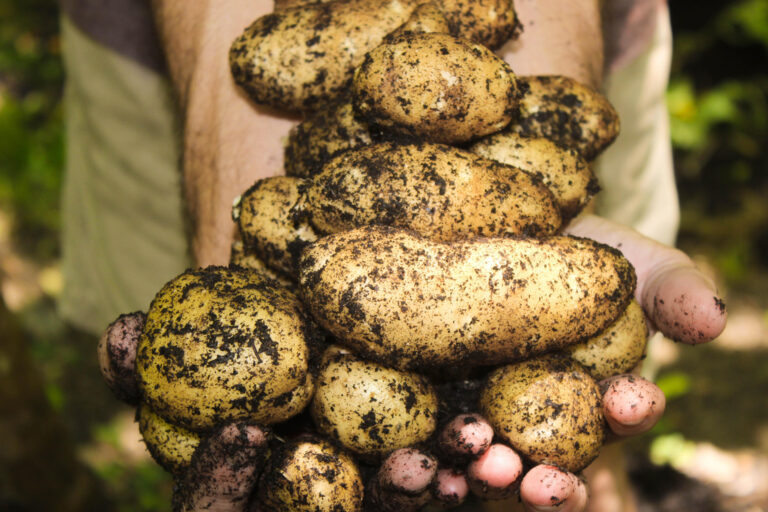
For others, it is a reality and a rewarding experience both mentally and physically.
With the advent of modern society, we have become accustomed to convenience and amenities that are accessible to everyone.
Inquisitive and adventurous minds have found that through meaningful research and listening to your intuition, living off the land is relatively easy to obtain if you let go of modern conveniences and live with less.
While this may not be necessarily true, we have access to knowledge that lends us a foundation on which to build a lasting life living closer to nature.
This may sound a bit preachy to some, but there is significance in living in harmony with the land.
The majority of the world already does this, through cycles of death, rebirth, and energy being recycled in many different forms.
Much of what we enjoy as a modern civilization also uses the same concepts, although usually in the background where we don’t see it happen.
This can effectively be observed through farming and agriculture, where we don’t do a lot of the work, but can pick up food easily enough from a grocery store.
This guide is designed to give you the foundation to prepare you for transitioning to a lifestyle of living off the land.
If you’re reading this, then you’ve already gotten past the first step and are open to new concepts anyway.
What Does Living Off The Land Mean?
Living off the land can be a lifetime of research as nature is both consistent and spontaneous. By most definitions, it means to create a sustainable life using the resources around you.
This includes: growing your own food, hunting for meat, building a home using natural resources, harnessing your own energy, and working within the laws of nature and the cycle of the planet.
As you can see, it’s quite a bit different than what we are used to in modern society. It requires knowledge of the resources around you, including flora and fauna.
You need to learn techniques for purifying water and heating yourself when the weather turns cold.
With no access to modern medicine (in the capacity that we know anyway) learning how to heal naturally with plants and herbs is necessary.
This also usually means you need to learn about how the human body works to be able to heal some of the more serious ailments, including physical injury.
The interesting thing that you’ll learn as you start down this journey is that it gets less intimidating the deeper you go.
There will be times when your strengths and weaknesses will shine, but overcoming them is worth it as you harvest your garden for the first time, for example.
Living off the land has plenty to offer, including returning to a simpler time where you don’t have to worry about mortgage payments or that 9-5 job that you slog away at day in and day out.
Instead, you’ll be given opportunities to grow with physical activity and lots of problem-solving.
The Journey Begins
Your living off the land journey begins with the first thoughts of changing your lifestyle.
After that, you’ll move on to the research phase where you’ll start to unlock the secrets of the wilderness and how you can sustainably utilize them to achieve your goals.
Research
Research is the first, middle, and last step of living off the land.
Without knowledge, you can’t start the activity and without experience, you can’t gain more knowledge, so you see how these work hand in hand.
Luckily, we have the power of the internet on our side with countless hours of video and text to peruse on your search for off-grid bliss.
Several experts can be found on YouTube and you can even engage with like-minded individuals through forums to learn from their mistakes and make your transition easier.
Mind you, this should mostly be done before you make the big move to your off-grid location.
As there will probably be no internet where you choose to go, physical books are a great resource to have at your disposal.
You’ll find that doing your research can be humbling and going into living off the land like you already know everything will have disastrous effects, most often a rude awakening to your lack of skills.
Individuals who have grown up camping and going on extended periods in the backcountry can easily tell you what a humbling experience it can be to be at the mercy of mother nature.
Finances
A simpler life can mean less money is needed to survive.
A lot of people who change their lifestyle to live off the land are looking for the freedom that money generally can’t provide.
Unfortunately, to get to this point, you will need to spend some money to get started.
Firstly, you’ll need to purchase the property that you want to prepare as a homestead for you and your family unless you plan on illegally squatting (which is not recommended).
Aside from purchasing the land, you will more than likely have expenses to get you started.
This can include things like equipment for farming, building supplies, or modern conveniences that you want to take with you on the journey.
All of this is okay as an off-grid vision is different for everyone.
The interesting thing is that the more research you do the less money you’ll spend. Sounds kind of odd, doesn’t it?
It makes sense because the more you learn to utilize the resources around you, the less money you’ll spend as you can probably fashion whatever it is yourself.
An example of this can be found in building your shelter.
Some people may purchase something like a yurt to set up on their land whereas some people may build a log cabin with logs they’ve cut down and insulation they have crafted themselves from clay, grasses, and other materials.
In a sense, the finances really depend on how much you want to invest before completely switching to living off the land.
Preparation
As with all things in nature, rushing a process is never a good thing. You’ll want to look at each aspect of living off the grid with a trial and error outlook.
What may work for some might not work for others, as our needs and the resources around us vary from place to place.
Make sure to have a plan for your immediate needs such as shelter, water, food, and fire which you can slowly start to transition over to your ideal setup.
It’s okay to start this journey slowly and piece by piece. As the saying goes: Rome wasn’t built in a day, and neither will your homestead.
Reading through this guide, for example, is a good way to start your research about transitioning to living off the land.
Using it as a stepping stone you can refine your research and come up with a solid plan to tackle each of the independent facets required to completely change your way of life.
How To Live Off The Land – Cycles And Lessons
This section of the guide is meant to give you a broad overview of the necessities (and luxuries) that are needed to be successful in your off-grid homestead.
It includes all of the basics needed for life plus some insight into the inner workings of mother nature.
This is by no means a complete guide, but instead, a foundation for you to learn and experience your own lessons.
Shelter
Building your home is a very personal experience and the construction will vary, depending on a few decisions.
The best thing you can do is to survey the land around you, or that you’ll be using to build your homestead.
Questions that should be running through your mind could be:
- Is there enough timber around me to build my own cabin?
- Is the ground underneath me suitable for building or will it erode?
- What will happen during storms? Will there be flooding or other issues?
- What resources are easily accessible near me? Are there waterways?
- What’s the view going to be like in the morning? (everyone loves the views)
Keep in mind that you may not be building your dream home right away.
Considerations like living in a trailer or having a canvas yurt set up are possibilities until you get more established and can turn your thoughts to a more permanent dwelling.
Starting low and slow will keep things simple enough until you get your feet wet living outdoors.
Heat
Generating your own heat is a requirement for two reasons. Firstly, you obviously need to keep yourself warm in the colder months, and secondly, it’ll probably be the same heat you use for cooking your food and sterilizing your water (unless you gather rainwater).
Most folks use a wood stove and that’s a smart decision in almost every case.
If you get a good wood stove they can be pretty efficient and they can also double as a cooking surface for your meals.
The best part is that wood is free fuel, and when living with nature, free is the name of the game.
Another excellent idea that is common is using clay to build a wood-fired kiln. Clay can be found in most riverbeds and once hardened, makes for an excellent oven and stove.
Considering clay ovens have been used for thousands of years as a heating source, it only makes sense.
A solar setup could be used to power a battery bank system that would enable you to use an electric heater.
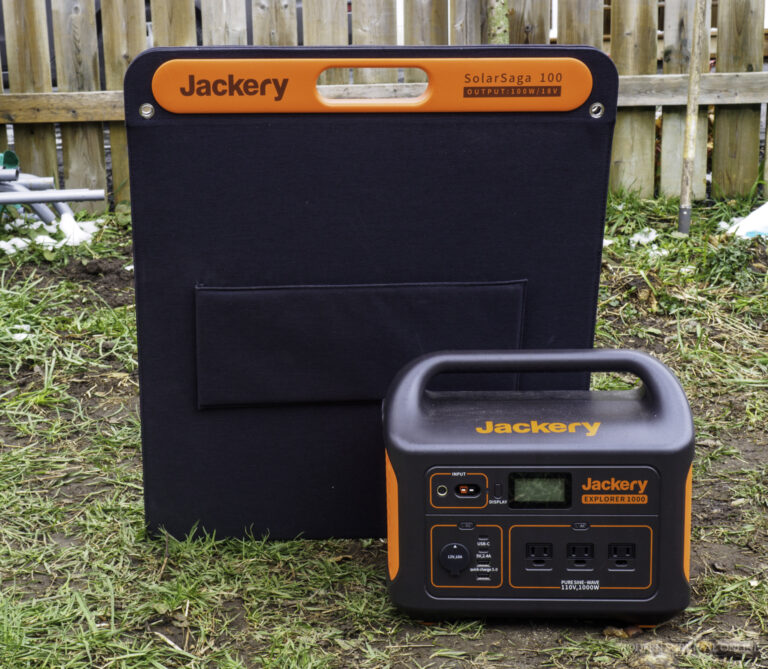
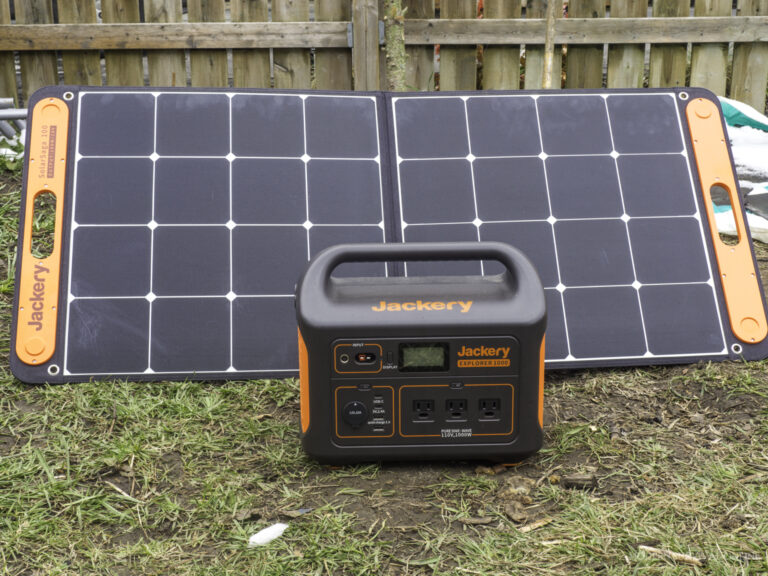
However, the downside is that there are a lot of parts that go into maintaining a solar battery system and it is dependent on the amount of sunlight you receive.
In the winter months, this could pose a problem as the sun isn’t as strong in the northern hemisphere as it is during the summertime.
Food
Food is necessary for survival and peace of mind. Most people only think of food as a way to stay alive, but you’d be surprised at how much happiness food can bring mentally.
An example that comes to mind is having a large meal cooking on the stove while a storm is going on; there is something so relaxing about knowing that you will survive with a full belly.
Making sure you have food is the one aspect that requires the most preparation when living off the land.
You are at the mercy of mother nature and will have to work with the various cycles that the planet goes through.
This seems to be one of the most daunting aspects of living off the land to many people looking to strike out on their own, but once you get into the rhythm and utilize your newfound experience it won’t be as massive a task.
Growing A Garden
Producing your own food generally starts with the construction of your own garden.
This is where you can get really creative by growing the foods that you know you’ll eat, and for the most part, they can be really easy to grow.
Ensuring you have the proper balance of sunlight, nutrients in the soil, and pest control will increase the success of your crops.
Monoculture seems to have taken over the agriculture industry and it is highly destructive to the soil as it depletes the nutrients within and leaves nothing for future crops.
Rotating crops is a common way to return nutrients to the soil as some plants give back essential macronutrients like nitrogen, phosphorus, and potassium.
Having a composting area is essential to a successful garden as it provides a means to create your own organic soil.
Soil is full of microbes that help break down organic matter and give plants easy access to the vital nutrients they require.
Compost teas are a liquid form of compost and are an effective way to return nutrients to the soil as your plants are growing.
Just as with the cycles of the earth, life and death are both needed to grow a beautiful garden.
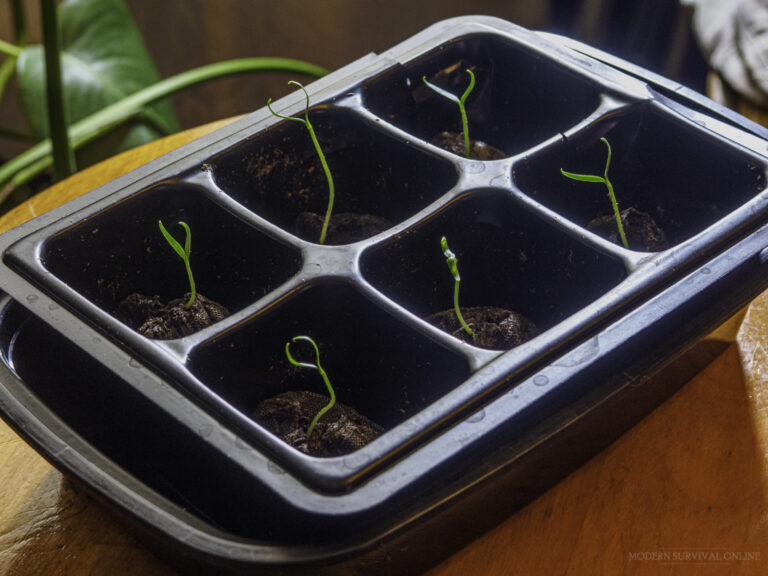
Meat – Fats And Proteins
While some vegetarians and vegans can definitely get by with just growing their gardens, some will eat meat and that requires a different approach than building a garden.
There are a couple of ways to get meat integrated into your off-grid diet with the first being to farm your own animals.
This entails that you’ll have a space dedicated to animals such as chickens, cows, or goats (they are the most common) and they can provide you with ample amounts of eggs and milk, not to mention meat.
Keep in mind that you will have to feed these animals, give them shelter, and a safe space away from predators. It is a lot of work but in the end, it’ll take care of a large part of your food needs.
Hunting, fishing, and trapping are other ways that you can get meat if you don’t want to have any farm animals.
All of these require a lot of practice and learning to listen to the land.
Looking for signs of animal passage, and knowing where they bed up or go for water are all important skills to master when out hunting.
Having various weapons like a bow and sling is handy to have and can be made using natural resources.
Water
Water is necessary for a few things, besides survival, it is used to water plants and animals, wash laundry, and even in the preparation of food.
Since it is so vital to the success of living off the land it’s best to have multiple sources available.
Sourcing water can start as early as selecting the property where you’ll be setting up your homestead.
Ensure that you have access to a water source that is running, whether this is a river, creek, or lake.
This makes for an excellent source of water that you can access if your primary source isn’t plentiful.
Digging a well is a common way to get fresh water to your homestead.
This method usually requires you to outsource to a private contractor who comes in and surveys the area, digs the well, and installs the pump.
This does depend on where you are located though, as not all sources of underground water are easily accessible.
Using rain barrels is a primitive way to capture rainwater and is effective if you have a lot of precipitation in your area.
Essentially the water is funneled into a barrel with a filter on the top that collects debris while the water is stored in a barrel.
Since rainwater is essentially free from adverse chemicals it is good as a backup solution. You can also use it to water your garden!
If you have to get your water from less than perfect sources, having a way to sterilize the water, whether it by boiling or using various chemical and membrane style filters is important.
Energy Production
This is more of an optional thing to have on your homestead, it really boils down to how off the grid you really want to go.
For most, documenting their experience on camera and sharing it with others is a humbling way of preserving those memories.
Others need the energy to keep their own self-built power systems online and functional.
Solar
This is the most common method of generating your own electricity.
This involves placing solar panels to capture the energy of the sun while then transmitting that energy into batteries which can then be used to power various electronics and appliances with an inverter.
If you robustly build the system (meaning lots of batteries) you can survive off the minimal sun in the times of the year when it’s not as strong.
Wind Generation
Micro wind generation is not a new technology, but it’s not used as widely as it could be. The wind is plentiful but unpredictable, and because of that, it makes for a good backup choice.
Having a 500-watt wind turbine on the roof of your home could be enough to power small electronics or an electric heater.
Hydroelectric Power Generation
This is an excellent option if you have a fast-moving river near where you live.
It uses the current in the waterway to rotate the turbine which then generates electricity for your charge controller and battery system.
Sanitation
Everybody has to poop and it’s no different out in the wild as you’re living off the land. Composting toilets are a popular choice as they don’t require any water for flushing.
There are two types, ones that accept both urine and feces and others that can only take feces.
These kinds of toilets rely on heat and microbes to break down the organic material that will then turn into compost.
When in doubt just dig a hole and put an outhouse over it. This is a common option that is inexpensive and requires no water to flush either.
Sawdust is a common topper after you’ve done the deed and can be obtained easily from your woodpile when processing firewood.
Of course, this is all subject to laws and regulations that are in the area you’re residing in. Remember to do your research to make sure you are in line with environmental laws.
Protection
If you’re living far enough out in nature then you might not have to worry about people bothering you, but there are wild animals that could be curious enough to merit some self-defense.
Having a dog is one of the simple things you can do to bring some joy to your home as well as a built-in security system.
Dogs have far keener senses than we do and can generally pick up on predators or other animals snooping around your homestead. It turns out that dogs really are man’s best friend!
Using trail cams to set up remote viewing points can also provide you with information on what’s been visiting your homestead to allow you to prepare accordingly.
The Seasons
If you’re living in North America you will undoubtedly experience all four seasons and it’s important to realize that you need to plan for each one.
Spring
The springtime is when you want to start preparing your gardens to be planted.
This includes working with the land and making sure you have everything needed for your plants to grow throughout the spring and summertime.
A lot of foraging can be done in this season as a lot of young plants make for delicious wild edibles.
Summer
Summertime is a great time to harvest berries and fruits from the land around you. In fact, a lot of your garden should be ready to harvest at this time too.
Summertime is also a great time to start preparing your woodpile for the winter.
In North America the winters tend to get very cold and being stuck without wood could spell disaster in an off-grid setup.
Fall
Harvesting and preserving your hard-earned food comes into play during this season. Cleaning up your garden and getting it ready for the winter months will make your job easier in the spring.
This is also a time to hunt wild game as most areas will be open up to hunting.
Ensure that you are following local laws and have the required permits and tags that are in place to promote conservancy.
Winter
Wintertime is all about enjoying the fruits of your labor throughout the year and is a good part of the year to plan out what you want to accomplish in the coming spring season.
Spend this time reflecting on your accomplishments and enjoy the sleeping forest.
Using Nature As Your Inspiration
A lot of the modern conveniences that we enjoy today have stemmed from something observed in the natural world.
In fact, you can even recreate some of these amenities using natural resources found all around you.
An example that comes to mind would be something like a wood-fired hot tub, or a sauna built from timber on your property.
Effects On Mental Health
Living off the land is not an easy task, and it can sometimes get exhausting, especially if you go at it alone.
Isolation and the struggles associated with living off the land can cause anxiety and unforeseen stresses.
These feelings eventually pass, and once you’ve gained enough experience you will relax more and more until it becomes natural to you to be living outdoors.
Keeping some modern conveniences such as movies and music can help with the hard times and if you got a dog for protection, they can also be a source of comfort for you.
Also keeping your physical body occupied with small projects and hobbies can help take the edge off.
Physical Health And Wellness
The mental choice to live off-grid can overcompensate for what your body can handle. Living off the land is physically tolling on our bodies and requires that we maintain a high level of health.
Knowing the limits that your body can handle will help avoid any costly mistakes that will leave you off your feet for extended periods.
Make sure to eat properly, stretch often, and only work as much as you know you can handle.
This is probably a good time to mention having an extensive first-aid kit for emergencies.
You never know when you’ll need medical attention, and paramedics more than likely won’t be able to reach you if you’re out far enough.
Taking a first responder course is also a good way to build up a strong foundation of knowledge to help you in a bind.
It’s Okay To Ask For Help
Unless you’re a hermit living far away from civilization, you more than likely have friends or family.
Pride can sometimes come into play, and that can cause people to not ask for help when it is needed.
Some jobs (such as building a home) can sometimes prove to be too big for one person to handle on their own.
Don’t be afraid to ask others for help with these things. Oftentimes you’ll find the experience enjoyable and people will be glad to aid you on your off-grid quest.
Additionally, it’s a great way to flex your newfound skills and hopefully inspire others to create their off-grid.
The Power Of Community
For as long as history has recorded human activity, we have embraced the idea of community and what can be accomplished as a group.
There is something incredibly powerful about a group of like-minded people pouring resources, experience, and knowledge together to create a community that is both sustainable and happy.
Of course, you should be sure to vet out anyone living in your community, but do it with an open mind, especially with people you don’t know very well.
The best way to go about this is to cultivate a group with similar ideals and do a trial run to see if it is a viable option for you.
If living with another group of people isn’t your way of doing things, at least keep the bridge connected if you or they need any help in the future.
Frequently Asked Questions
Here are some common questions that people have about living off the land and how to get started.
How Much Land Do You Need To Successfully Live off the Land?
This answer will be different for everyone as it depends on how large you want to make your homestead.
The general consensus is that you can successfully create an off-grid homestead on as little as ¼ of an acre.
This is more for people who want to live within a suburban area and as you venture out into more and more wilderness, plots of land become larger.
What Should I Plant in My Garden for Food?
You can plant anything you want in your garden, your imagination is the limit. However, you may want to consider only growing things that you or your family would enjoy.
This eliminates the possibility of unwanted waste and gets you more familiar with what grows best in your area.
What Kind of House Should I Build on My Property?
There are many different types of houses you can build on your property, but there are some things you should consider before choosing which one works best for you.
Deciding on whether or not you even want to build a house yourself should be one of the first questions you ask yourself.
If a prefabricated home is what your heart desires, several companies specialize in off-grid homes made with sustainable materials.
An example would be Mitchcraft Homes in the US, which specialize in building tiny homes meant for off-grid living.
Yurts are an excellent choice and are generally made of thick canvas, have spacious interiors, and are weather resistant.
Building your own home? Log cabins are a great way to build a home that can stay warm in the winter and cool in the summer months.
This is a labor-intensive process but also equally rewarding once it’s finished.
How Do I Find a Piece of Land That Works for My Vision of Living off the Land?
Researching your ideal piece of land can be done in a few ways.
Some people watch others living off the land through videos on YouTube and get a general idea of what they’re looking for.
It’s also a great excuse for a road trip to go and explore potential areas where you might like to settle down.
There Is So Much Information To Learn Before Living off the Land, Where Do I Start?
Online resources are the most accessible for most. For those who don’t want to use the internet, there are a variety of books that can help you get started on your living off the land.
When you visit an external link on this page and then make a purchase, I may earn a commission. Read my full advertising disclosure here.
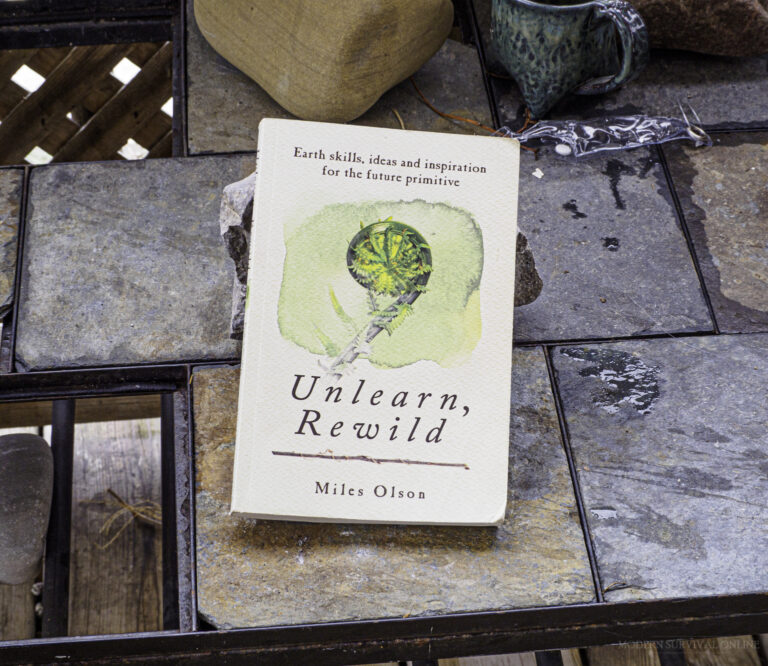
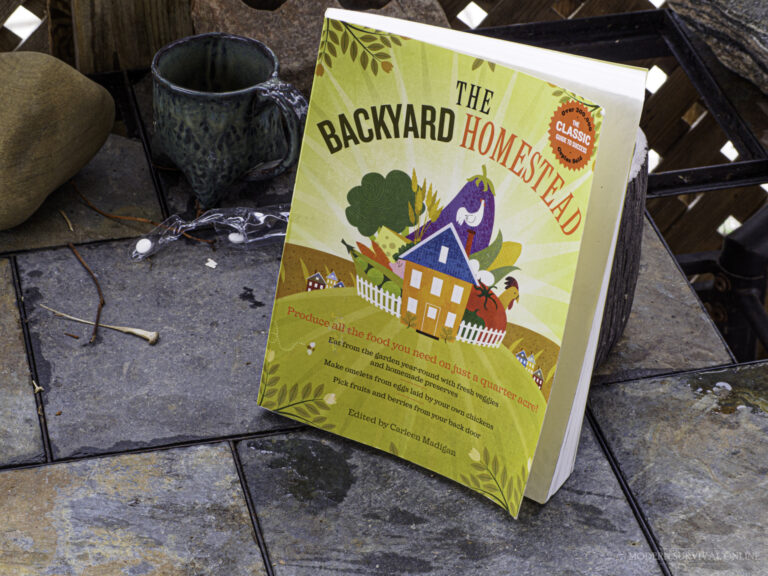
- The Backyard Homestead By Carleen Madigan
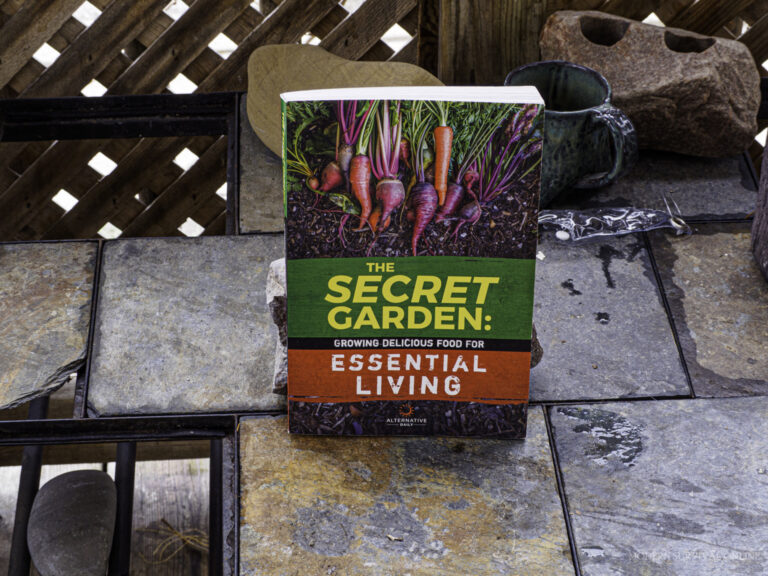
- The Secret Garden: Growing Delicious Food For Essential Living by Susan Patterson
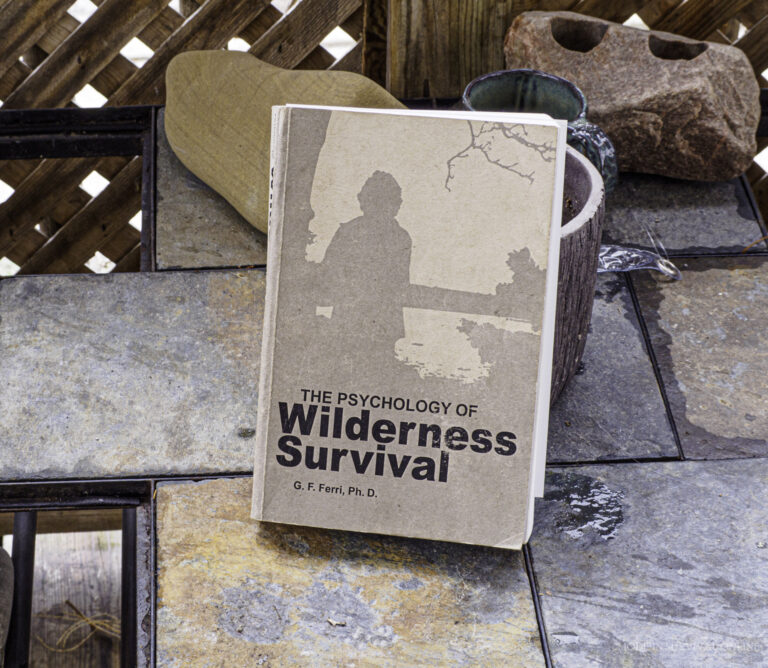
- The Psychology Of Wilderness Survival by G. F. Ferry
- Living Off The Land By Christopher McNab
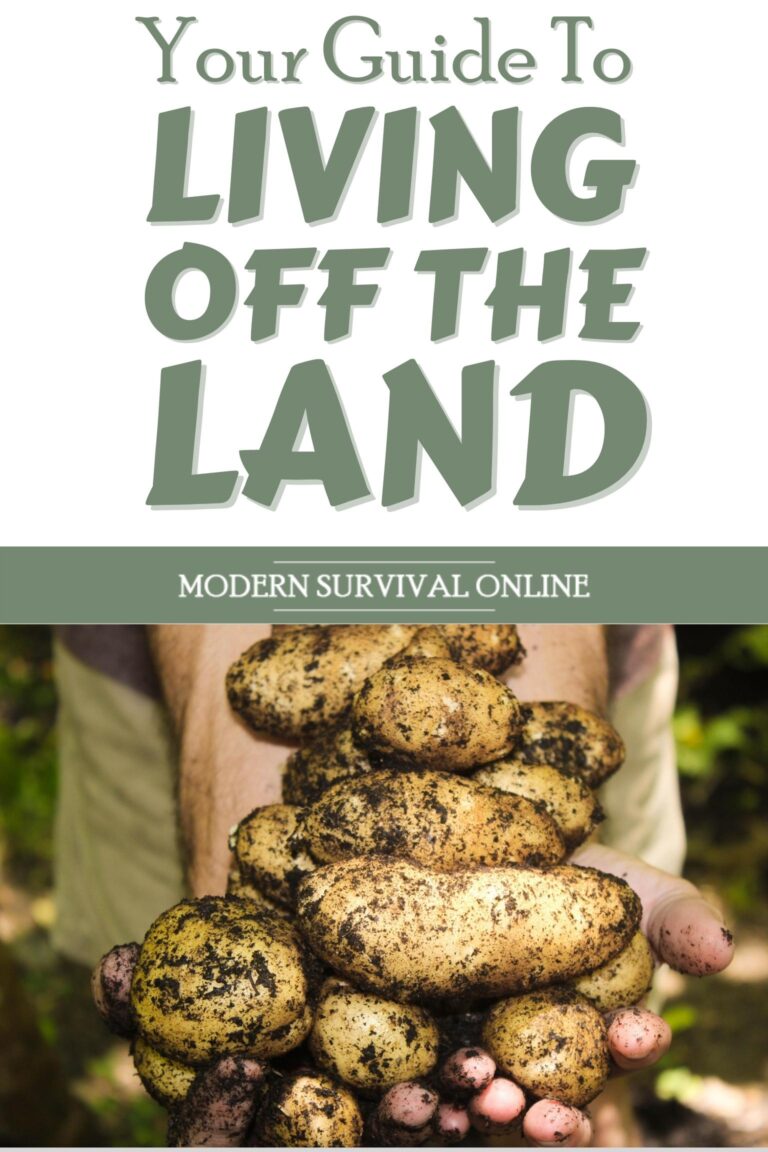
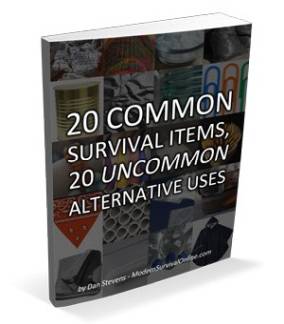
Like what you read?
Then you're gonna love my free PDF, 20 common survival items, 20 uncommon survival uses for each. That's 400 total uses for these dirt-cheap little items!
We will not spam you.